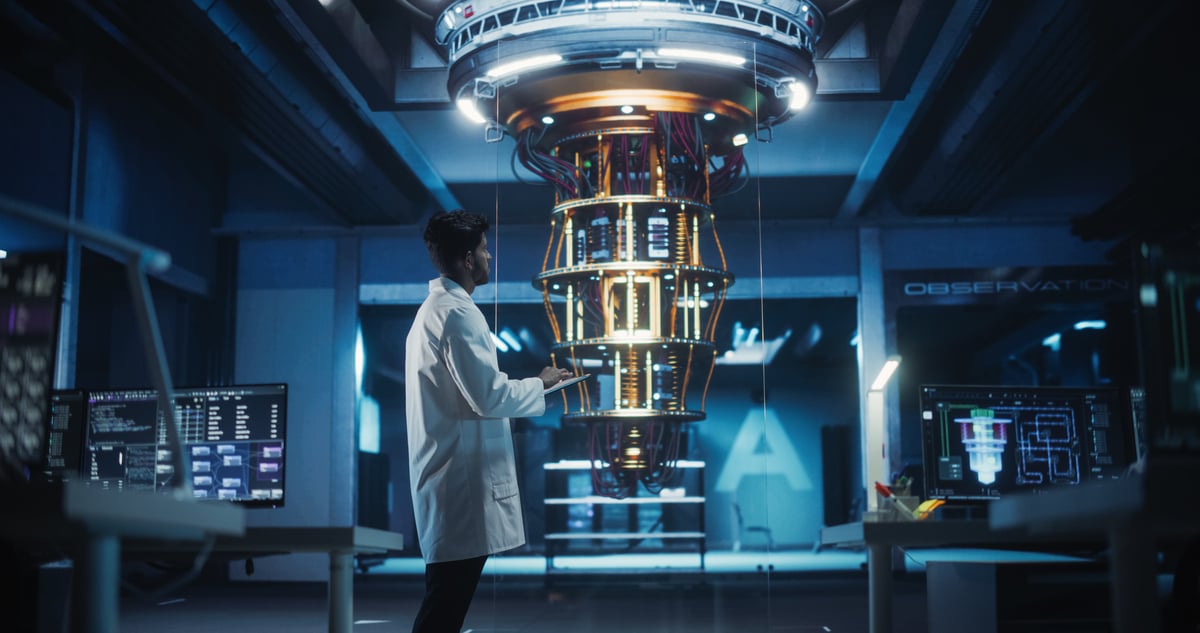Rigetti Computing (RGTI +4.83%) and CoreWeave (CRWV +7.66%) both look like exciting growth plays for investors who can tolerate a lot of risk. Rigetti is an early mover in the quantum computing market, and CoreWeave is one of the market's fastest-growing artificial intelligence (AI) companies.
Over the past 12 months, Rigetti's stock gained more than 970%. CoreWeave, which went public in March, has already soared about 250% from its IPO price of $40. Should you chase either of these high-flying hypergrowth tech stocks today?

Image source: Getty Images.
Rigetti's nascent business has room to grow
Rigetti provides quantum processing units (QPUs), full quantum systems, and a cloud-based platform for developing quantum applications. That makes it a one-stop shop for quantum computing solutions, and it has been expanding its menu of offerings with cheaper commercial systems and modular systems that link together multiple systems.
Classical computers store and process data in binary bits: zeros and ones. Quantum computers use a different paradigm that takes advantage of the peculiarities of quantum mechanics: They use qubits, which can be ones or zeroes, but can also have values that are probability amplitudes -- complex weighted combinations of those zero and one states.
As an investor, you don’t need to understand how it works: What matters is that using qubits to process calculations allows quantum computers to quickly get answers to some unusual types of problems that would take years or even centuries for classical supercomputers to solve. The downsides are that quantum computers are bigger, pricier, and consume much more power.
Also, because qubits are finicky and fragile, outside interference can flip their states. As a result, today's quantum computers produce errors once every few hundred operations, vastly more often than traditional computers, whose ratios are measured in errors per billion or trillion operations. To make quantum computing technology truly useful, its error rates will have to come down to magnitudes of one in a million or better.

NASDAQ: RGTI
Key Data Points
Rigetti's big customers include the Superconducting Quantum Materials and Systems Center, the Air Force Research Lab, and the Horizon Quantum Computing in Singapore. Its recent product launches include its smaller 9-qubit Novera QPU for commercial customers and its 84-qubit Ankaa 3 quantum system for government and research clients. It plans to launch a new modular system, which connects four of its 9-qubit systems to create a 36-qubit system, later this year. It aims to launch a non-modular 100-qubit system in 2026.
Rigetti's revenue declined by 8% in 2023 and another 10% in 2024, mainly due to its lack of new R&D milestone payments and the uneven timing of payments from its government and research contracts. The company's net loss also widened from $75 million in 2023 to $201 million in 2024.
But from 2024 to 2027, analysts expect its revenue to grow at a compound annual rate of 52% from $10.8 million to $37.7 million, and expect it to narrow its net loss to $85.4 million. That acceleration should be driven by more commercial contracts and even more powerful systems.
But with a market cap of $3.3 billion currently, Rigetti already trades at 87 times its estimated sales for 2027. It might eventually grow into that valuation if it scales up its business and its quantum systems become more widely adopted for mainstream computing applications, but that valuation bubble could also burst if it fails to meet Wall Street's high expectations. That might be why company insiders sold five times as many shares as they bought over the past 12 months.
CoreWeave has carved out a high-growth AI niche
CoreWeave was founded as an Ethereum-mining business in 2017, but it abandoned that market after the cryptocurrency crash of 2018. The company then repurposed its crypto-mining GPUs (graphics processing units) to power AI tasks on its new cloud infrastructure platform, which it significantly expanded with a $100 million purchase of Nvidia's H100 GPUs in 2022.
CoreWeave then leveraged its GPUs as collateral to secure even more funding, and it attracted some big investments from Nvidia, Cisco, and PureStorage. That support helped the company expand from just three AI data centers at the end of 2022 to 33 such locations across the U.S. and Europe today. It claims its dedicated GPU approach makes it roughly 35 times faster and 80% cheaper for tackling AI tasks than traditional cloud platforms, and its top customers already include AI leaders like Microsoft and OpenAI.

NASDAQ: CRWV
Key Data Points
As CoreWeave opened more data centers to meet the growing demand in the AI space, its revenue surged from $16 million in 2022 to $1.92 billion in 2024. However, its net loss widened from $31 million in 2022 to $863 million in 2024 as it bought and leased more data centers, bought more GPUs from Nvidia, and dealt with higher energy costs.
From 2024 to 2027, analysts expect CoreWeave's revenue to soar at a compound annual rate of 105% to $16.55 billion, and expect it to narrow its net loss to $747 million. That's an impressive growth trajectory, but soaring expenses and high debt could throttle long-term expansion. It could also face fresh competition as bigger cloud platforms roll out more dedicated AI services.
With a market cap of $67.3 billion, CoreWeave seems more reasonably valued than Rigetti at 4 times its estimated sales for 2027. But when its lockup period expires on Sept. 24, a lot of its insiders could rush to sell and take profits on the high-flying stock.
The better hypergrowth play: CoreWeave
Rigetti might have a bright future as the quantum computing market expands, but its business is still wobbly and it is trading at meme stock valuations. CoreWeave is also risky, but it's growing faster and its valuations look more reasonable. So if I could only pick one of these hypergrowth stocks today, I'd choose CoreWeave.





